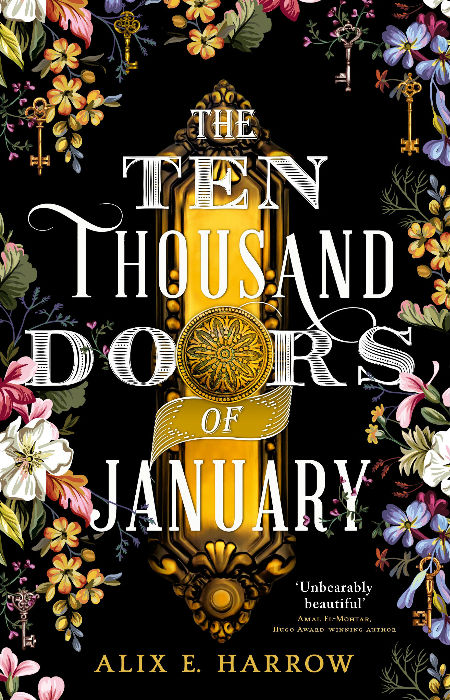
Ask anyone who has ever fallen in love with the written word, and by fallen I mean with that desperate sense of urgency that says words and stories are life itself and their absence is a slow and lingering death, and they will testify with unbridled passion about the power of stories to change things.
It is well nigh impossible, if you are really investing yourself in the stories you read, not to walk unchanged in ways big and small; you cannot be the same person finishing a book that you were starting it, with stories getting deep inside you and remaking how you see and interact with the world.
That was very much the case with this reviewer who as a child, a child it should be added who was constantly and horrifically bullied, discovered in each book he read not only worlds to escape to but ideas to embrace, emotions to own, perspectives to take on as his own.
It was, and remains, transformative to surrender yourself to stories, something that the protagonist of Alix E. Harrow’s luminously beautiful and emotionally resonant novel, The Ten Thousand Doors of January, knows intimately well as her remarkable story unfolds.
The child of a man who goes around the world collecting exotic oddities and artifacts for his rich employer Mr Locke, January Scaller doesn’t fully appreciate just how powerful words can be until a series of events when she is seventeen catapult her from a sheltered life in Locke’s compound into a world seething with powerful words, Doors (the capital “D” is obligatory in this instance) and people who wish to use them for both good and ill.
“But I persist in writing, even when it feels like pressing forward through an endless briar patch, even when the ink looks smeary-red in the lamplight.
Perhaps I keep writing because I was raised in a world where words have power, where curves and spirals of ink adorn sails and skin, where a sufficiently talented word-worker might reach out and remake her world. Perhaps I cannot believe words are entirely powerless, even here.” (P. 234)
It is revelation to a young “coloured” woman in the early 1900s who has gone from a wild tearabout girl, eager to explore the world, near and far, to one unhappily constrained by Locke and her governess Miss Wilda, a stern, black-clad woman who still harbours a sense that the world outside is bigger and more expansive than she has ever imagined.
Unable to express this longing to roam, and roam expansively in a physical sense, January pours her imagined explorations into journals, emboldened by odd discoveries such as a Door in a field in Kentucky that seems to lead to a world full of white buildings, endless briny sea and golden sun and people with whom she feels some sort of inexplicable connection.
But, of course, none of this can be real, and stories cannot transcend reality, or so Locke says, and so as she leaves her girlhood behind, January is forced to grapple with the world and all its scary, messy contradictions without the transcendent beauty and power of words and stories, her only companions in a lonely childhood marked by emotional deprivation and a draconian embrace of banal reality and oppressive rules over the glorious freedom of untrammelled, vividly-expressed imagination.
You feel January’s loss keenly throughout with Harrow, whose prose is gorgeously, memorably, startlingly lush, heartfelt and pulsing with the heartbeat of humanity, bringing her hopes & dreams, losses and pain and tenacious hope to life so powerfully that you can feel the force of the young woman’s need to throw off the bonds that, for all intents and purposes, imprison her, body and soul.

Stories then, for January, but if you think about it, for all of us, are powerful agents of change, portals to places, thoughts, ideas and emotions that otherwise might never cross our path.
The Ten Thousand Doors of January is in so many richly-rewarding ways a love letter to stories and words, a stark examination in many ways (though with the promise of the liberating richness repressed within) to the idea that living without them is no real life at all.
You see this again and again in January’s life which is so tightly tucked into the narrow parameters Locke has almost cruelly set for it that she is a shadow of who she could be if only she could follow her heart’s desire and embrace the stories, especially those in a mysterious book The Ten Thousand Doors which she finds in a trunk in Locke’s mansion one day, that so captivate her.
Or would captivate her if only she could return to the great love of her childhood – writing and reading stories. (She is aided in this endeavour by the son of the local greengrocer who brings her Penny Dreadfuls and other pulpy story magazines whenever he visits her home.)
This marvellously lovely, utterly enrapturing book, which sings with possibility and glows with its heartfelt paean to the power of stories, is a joy because it celebrates something that is intrinsic to anyone with vision, imagination and a sense that this world, this plain, old boring, limiting world is not all there is to this life and that there are other worlds out there that await us, and which have already had a huge influence on the fairytales, myths and fiction that we hold dear.
“Apparently, without money I wasn’t perfectly unique or in-between or odd-colored; I was simply colored. I felt something cold settle over me at the thought, a weight of rules and laws and dangers that hung on my limbs, pressed on my lungs.
I shuffled to the back without protest. I didn’t plan to be stuck in this stupid world with these stupid rules for much longer, anyhow.” (P. 304)
To say anymore about the narrative would be to give away far too many intoxicatingly wonderful details about this magically lyrical book which almost leaps out your hand such is the exuberant desire it houses to make the very most of this life and the opportunities that come when we give ourselves to the tremendous power of the written word.
Immersing yourself in The Ten Thousand Doors of January, which crackles along with brilliantly-realised characters, an invigoratingly boisterous and emotionally-intense (in the very best of ways) story – surely that is an inviolable requirement of a book that celebrates stories; happily it’s very much the case – and a gloriously goody sense of something promising in the air (even at January’s lower points, hope doesn’t entirely desert her though it feels as if it comes close) is an exquisite pleasure throughout.
This is a book that feels utterly unique in its execution and outlook and yet comfortingly familiar especially if like this reviewer you long ago realised that stories possessed the ability to take your life in directions that could change you in the most fundamental of ways, even during those times, like the neverending school years that blighted my childhood, when it seemed like change was never going to arrive and your literarily-fed dreams were going, despite hope ascendant, going to amount to precisely nothing.
The Ten Thousand Doors of January is a stunningly beautiful gift that is as captivatingly written as its story is enthralling, a book that is the very thing it holds aloft as a treasured and impossibly rare, alluring thing worthy of endless veneration – a repository of the stories that shape us, change us, and take us on through times hard and unyielding, holding out the hope that perhaps these stories are more real than we have given them credit for, and that perhaps, we would be best to take them literally and see which magical, life-transforming and otherworldly places they can take us.